IOM-GU Iraq IDP Study
Access to Durable Solutions Among IDPs in Iraq:
Findings from 6 years of a panel study on displacement (2016-2021)

Access to Durable Solutions Among IDPs in Iraq is a unique study tracking the same internally displaced persons (IDPs) over time. This joint project between the International Organization for Migration and Georgetown University follows almost 3,500 households of Iraqis displaced by ISIS/ISIL. The panel study extends over five years and six rounds of data collection. Using mixed methods (quantitative and qualitative), the study follows the families as they return to their homes, or relocate elsewhere inside Iraq or beyond, or stay and work to integrate in the places where they found safety.
While the study is of direct relevance to Iraqi IDPs and the Iraqi government, it also serves as a reference for those working with internally displaced populations globally. Qualitative interviews with host communities as well as aid providers (local, national, and international) enrich the data with other dimensions of the displacement experience.
This unique study offers a wealth of data and information about the criteria for accessing a durable solution as well as the issues facing Iraqis today: Safety and Security; Standard of Living; Livelihood and Employment; Housing, Land, and Property; Personal and Other Documentation; Family Separation & Reunification; Participation in Public Affairs; and Access to Justice.
Read more about the study here. The publications resulting from the study follow.
Reports:
Access to Durable Solutions in Iraq: Six Years in Displacement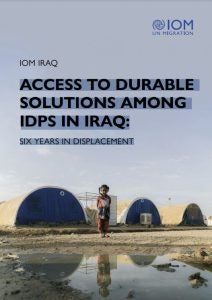
Summary report from six rounds of data. January 2022.
Five Findings on How IDPs In Iraq Are Coping with the Coronavirus Pandemic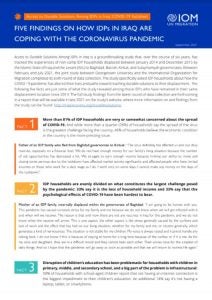
The study asked IDP households about how the COVID-19 pandemic has altered their lives and paths toward reaching durable solutions to their displacement. September, 2021.
Access to Durable Solutions Among IDPs in Iraq: Five Years in Displacement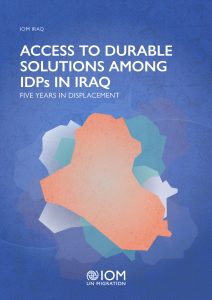
This report delves into three critical topics relating to IDP and returnee households: education, healthcare, and justice. November, 2020
Access to Durable Solutions Among IDPs in Iraq: Livelihoods and Economic Security in Displacement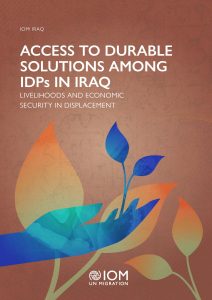
Focuses on IDPs’ and returnees’ opportunities for livelihoods and abilities to make ends meet, November 2020
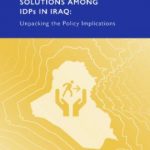 Access to Durable Solutions Among IDPs in Iraq: Unpacking the Policy Implications
Access to Durable Solutions Among IDPs in Iraq: Unpacking the Policy Implications
Policy implications for the Iraqi government, the national and international humanitarian community, and researchers studying displacement, Oct 2020
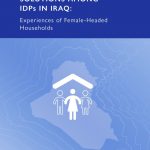 Access to Durable Solutions Among IDPs in Iraq: Experiences of Female-Headed Households
Access to Durable Solutions Among IDPs in Iraq: Experiences of Female-Headed Households
Experiences of female-headed households five years after displacement, Sept 2020
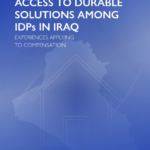 Access to Durable Solutions Among IDPs in Iraq: Experiences Applying to Compensation
Access to Durable Solutions Among IDPs in Iraq: Experiences Applying to Compensation
Property damage and compensation among IDPs and returnees, Jan 2020
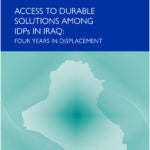 Access to Durable Solutions Among IDPs in Iraq: Four Years in Displacement
Access to Durable Solutions Among IDPs in Iraq: Four Years in Displacement
Summary Report From Four Rounds of Data Collection, Nov 2019
Access the report in Arabic here.
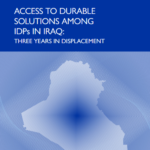 Access To Durable Solutions Among IDPs In Iraq: Three Years In Displacement
Access To Durable Solutions Among IDPs In Iraq: Three Years In Displacement
Summary Report From Three Rounds of Data Collection, Feb 2019
Access to Durable Solutions Among IDPs in Iraq: Moving in Displacement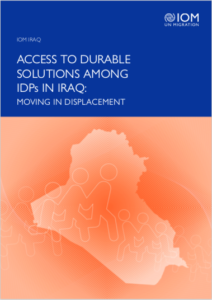
Secondary migration of IDPs and analysis of why IDPs move, Sept 2019
Access To Durable Solutions Among IDPs In Iraq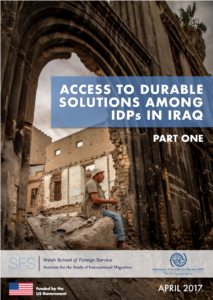
Baseline Report of One Round of Data Collection, April 2017
Articles:
Iraqi IDP Returns to Former ISIS-Held Areas: Findings from a Longitudinal Study on Durable Solutions
Jadaliyya, October 1, 2018
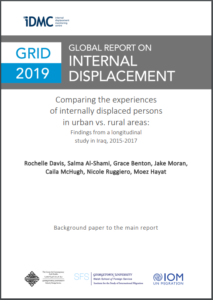
Comparing the Experiences of Internally Displaced Persons in Urban vs. Rural Areas: Findings from a Longitudinal Study in Iraq, 2015 – 2017
Internal Displacement Monitoring Centre, Global Report on Internal Displacement Background Paper, Feb. 2019
Scholarly Papers:
Iraqi IDPs Access to Durable Solutions: Results of Two Rounds of a Longitudinal Study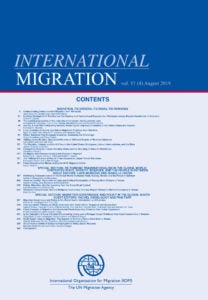
International Migration, 2018. Vol 57, Issue 2
Authors: Lorenza Rossi, Rochelle Davis, Grace Benton, Sinan Zeyneloğlu, Salma Al-Shami
Home After ISIS: A Study of Return as a Durable Solution in Iraq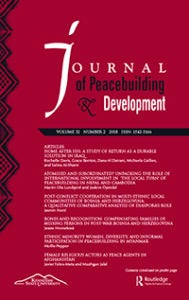
Journal of Peacebuilding and Development, June 2018
Authors: Rochelle Davis, Grace Benton, Dana Al Dairani, Michaela Gallien, Salma Al-Shami
Conferences & Presentations:
Achieving Durable Solutions to Displacement in Iraq: Challenges, Opportunities, and Possible Remedies
Presented Online for Mercy Corps, Georgetown University’s Center for Contemporary Arab Studies and Institute for the Study of International Migration, December 8, 2021
Displaced Populations, Durable Solutions, and Data
A methodology workshop presented at Georgetown University’s Center for Contemporary Arab Studies, September 26, 2019
The Politics and Challenges of Iraq’s Displaced Communities
Presented at the Gulf International Forum, July 7, 2021
Social Cohesion of Displaced Populations and Host Communities in Iraq
Presented at Conference and Policy Forum on Impacts of Refugees and IDPs on Host Communities: World Bank, Washington DC, June 2017
Organization of Migration and Displacement in Iraq Conference, April 19-21, 2017
Hosted by the University of Kurdistan, Hawler with co-sponsorship of IOM, Georgetown University’s Center for Contemporary Arab Studies and Institute for the Study of International Migration
Study Details:
Migration, both forced and voluntary, has long been a major part of Iraqis’ lives. Over the past three decades, at least six million Iraqis (out of a total population of 33 million) have been forcibly displaced inside and outside of Iraq. [See our annotated bibliography: Internal Displacement in Iraq 2003-2016] Starting in late 2013, the Islamic State of Iraq and the Levant’s (ISIL) swift takeover of areas of northeastern Syria and northwestern Iraq displaced millions more. As a result, many Iraqis have been displaced multiple times while others experience situations of protracted displacement. And now, millions of Iraqis are returning home.
Starting in 2015, IOM-Iraq and Georgetown University’s Institute for the Study of International Migration and the Center for Contemporary Arab Studies, began a longitudinal study to understand how Iraqi internally displaced populations (IDPs) find solutions to their displacement. The study is based in the IASC Framework on Durable Solutions for Internally Displaced Persons, which is a rights-based assessment. According to the framework, “A durable solution is achieved when internally displaced persons no longer have any specific assistance and protection needs that are linked to their displacement and can enjoy their human rights without discrimination on account of their displacement. It can be achieved through:
- Sustainable reintegration at the place of origin (hereinafter referred to as “return”);
- Sustainable local integration in areas where internally displaced persons take refuge (local integration);
- Sustainable integration in another part of the country (settlement elsewhere in the country)” (Quick Reference Guide: IASC Framework on Durable Solutions for Internally Displaced Persons, 2010)
The eight criteria are that enable access to a durable solution are: Safety and Security; Standard of Living; Livelihood and Employment; Housing, Land, and Property; Personal and Other Documentation; Family Separation & Reunification; Participation in Public Affairs; and Access to Justice.
The IOM-GU mixed-method study collects data from surveys and interviews from the same 4,000 Iraqi IDP households displaced between January 2014 and December 2015 by ISIL over all rounds of the study. The findings of the study generalize to non-camp IDP households originally from Anbar, Babylon, Baghdad, Diyala, Kirkuk, Ninewa, and Salah al-Din (seven governorates of origin) who were displaced to one of four governorates where the study was fielded: Baghdad, Basra, Kirkuk, and Sulaymaniyah. To date, five rounds of data have been collected:
Round 1: March-May 2016
Round 2: February-April 2017
Round 3: July-September 2017
Round 4: August-November 2018
Round 5: October-December 2019
The study is funded by the U.S. Department of State, Bureau of Population, Refugees, and Migration.